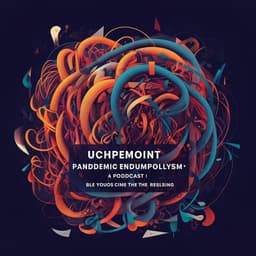
Political Science
Chinese online nationalism as imaginary engagement: an automated sentiment analysis of Tencent news comments on the 2012 Diaoyu (Senkaku) Islands incident
Q. Zhang and C. Wang
This research by Qiaoqi Zhang and Cheng-Jun Wang explores how Tencent shapes news narratives to manage popular nationalism, particularly during the 2012 Diaoyu Islands incident. Through extensive sentiment analysis of over 500,000 comments, the study unveils the shift from stimulative to restrictive nationalist narratives to maintain social governance, revealing the emotional dynamics that influence online nationalism.
~3 min • Beginner • English
Introduction
The paper addresses the debate over how the Internet shapes Chinese nationalism, noting mixed evidence on whether digital media amplify or constrain nationalist sentiment. Prior work highlights both the rise of chauvinistic online nationalism and the coexistence of criticism and pro-government voices in a state-controlled online environment. The authors argue that most discussions overlook how audiences engage with nationalism and how platforms respond. They propose that Chinese online nationalism constitutes an imaginary engagement produced through the interaction of platforms, audiences, and the government. Using Tencent as a case during the 2012 Diaoyu (Senkaku) Islands incident, they examine platform framing, audience expression, and their interplay. The study posits that platforms balance state oversight and audience market incentives, encouraging nationalism when beneficial and restricting it when it threatens social stability. Research question: How is Chinese online nationalism constructed in the news of commercialized news portals and in audiences’ comments, respectively? The study also advances three hypotheses: H1 (restrictive news reduces support for China), H2 (greater engagement increases support for China), and H3 (audience emotions increase support for China).
Literature Review
The authors conceptualize online nationalism as imaginary engagement rooted in Anderson’s imagined community, extended to cyberspace where audiences infer national identity through mediated content. Platforms and audiences co-construct this engagement: audiences consume, like/dislike, and comment; platforms seek traffic but also comply with Party-state directives, using agenda setting and framing to guide perceptions. Nationalism includes rational and irrational elements; Chinese discourse distinguishes rational patriotism (non-violent, stability-preserving) from irrational patriotism (boycotts, violence). Platforms deploy restrictive strategies—obscuring boundaries, blurring collective memory, and reducing engagement—to temper risks to governance, often promoting rational patriotism and positivity bias that correlate with national pride and political trust. The government shapes nationalism via regulation and propaganda while avoiding excessive mobilization that could backfire. From this, the authors derive: H1: restrictive strategy reduces audience support for China; H2: greater audience engagement (longer comments, more content) increases support for China; H3: emotions (anger, disgust, love, etc.) heighten support for China.
Methodology
Data and context: The study focuses on Tencent’s coverage of the 2012 Diaoyu (Senkaku) Islands incident, analyzing the Jinri Huati special series and associated user comments on Tencent News. Over 500,000 comments tied to 18 Jinri Huati articles (May–September 2012) were scraped using the Shuimiao system, which aimed to collect the complete set of comments rather than samples.
News framing coding: The first 18 Jinri Huati pieces covering the incident were manually coded as stimulative or restrictive based on whether they emphasized national boundaries, collective memory, or encouraged engagement (stimulative) versus obscured boundaries, blurred memory, or explicitly reduced engagement by calling for rational patriotism (restrictive). Two coders independently coded the 18 items; intercoder reliability for this binary coding was 1.0.
Comment sentiment coding (training set): A five-level nationalist sentiment scheme was developed for comments: very high (2), high (1), neutral (0), low (-1), very low (-2), with examples provided. Two coders labeled training comments with intercoder reliability metrics: Holsti 0.91, Scott’s Pi 0.84, Cohen’s Kappa 0.84, Krippendorff’s alpha 0.88.
Automated analysis: Emotions in comments (anger, disgust, fear, happiness, sadness, surprise, love) were measured with the Python package cnsenti, drawing on Ekman’s basic emotions and Xu et al.’s lexicon. Nationalist sentiment proportions were estimated using the Automated Sentiment Analysis Program (ASAP), adapted from Hopkins and King’s unbiased estimation method for category proportions. Steps included: (1) Chinese word segmentation using ICTCLAS; (2) building a hand-coded training set of 300–500 comments per news item; (3) constructing a word table recognizing terms indicative of sentiment categories; (4) estimating unbiased proportions of sentiment levels across all comments; (5) reporting proportions.
Statistical modeling: To test hypotheses, the authors conducted OLS and mixed-effects logistic regressions on 6,398 comments, coding the dependent variable Support China as 1 for high or very high sentiment and 0 for neutral/low/very low. Key predictors included restrictive vs stimulative framing of the corresponding news, engagement (number of words and sentences per comment), and the presence of each emotion. Mixed-effects models used news ID as a grouping factor.
Key Findings
Platform framing and timing: Tencent’s Jinri Huati reports lagged incident developments but intensified during peaks (late August–September 2012), consistent with agenda setting and framing. Of 18 news items, 16 were restrictive and 2 stimulative (early in the incident). After violence escalated in mid-September, Tencent consistently emphasized rational patriotism and reduced engagement frames.
Engagement levels: Comment volumes spiked in late August and early September, indicating heightened audience engagement during the conflict’s climax.
Sentiment distribution: Across all comments, the high level category dominated (mean 70.57%), very high accounted for 15.88%, neutral 11.80%, low 1.49%, and very low 0.28%, indicating predominantly rationalist expressions with a nontrivial extreme component. Spikes of very high sentiment exceeded 40% for the 2nd and 7th news items but generally stayed below 30% thereafter and mostly under 20% between the 8th and 18th items.
Regression results (Table 3): In mixed-effects logistic models (news as random intercept), restrictive framing had a significant negative association with Support China compared to stimulative (coef ≈ -0.205, p<0.001), supporting H1. Engagement measures were positive and significant: number of words (≈ 0.050, p<0.001) and number of sentences (≈ 0.050, p<0.001), supporting H2. Emotions: love (≈ 0.480, p<0.001), anger (≈ 1.013, p<0.001), disgust (≈ 0.297, p<0.001), and fear (≈ 0.557, p<0.001) increased Support China; happiness decreased it (≈ -0.380, p<0.001). Sadness was positive (≈ 0.099, p<0.01). Surprise was not significant. Observations: 6,398. Model fit indices reported (e.g., AIC 3405.9 for mixed-effects model with emotions). These findings largely support H1–H3.
Discussion
Findings show Tencent strategically framed coverage to manage online nationalism: stimulative narratives briefly catered to anger but quickly shifted to restrictive frames promoting rational patriotism as offline protests escalated. This tempering likely aligned with state imperatives to prevent collective action and maintain legitimacy. Comment sentiment patterns indicate strong but mainly rationalist support for China, with extreme calls present but constrained following the restrictive shift, suggesting effective platform moderation of nationalist expression.
These results support the central claim that Chinese online nationalism manifests as imaginary engagement produced through collusion among platforms, audiences, and the government. Platforms accrue traffic and revenue while aligning with state directives; audiences satisfy emotional and expressive needs through online discourse; and the state secures legitimacy by channeling and constraining potentially destabilizing nationalism. Framing functions as a soft tempering device, complemented by censorship as a harder mechanism. The online arena proves more governable than offline protest, underscoring the role of commercial platforms in stabilizing nationalist affect in ways that favor regime stability.
Conclusion
The study reframes Chinese online nationalism as imaginary engagement arising from the interplay of platforms, audiences, and the state. Using large-scale Tencent comment data from the 2012 Diaoyu (Senkaku) incident and automated sentiment analysis, it demonstrates that restrictive news framing reduces popular nationalism, higher engagement correlates with stronger support for China, and specific emotions (love, anger, disgust, fear) boost support while happiness dampens it. The predominance of high (rationalist) sentiment over very high (extreme) suggests that platform strategies successfully temper excessive nationalism while sustaining audience interest and regime-supportive discourse. This contributes to debates on the Internet’s role in Chinese nationalism by highlighting how commercial platforms both amplify and contain nationalist expression.
Future research could extend this framework across platforms and events, incorporate direct measures of censorship dynamics, explore causal mechanisms via experiments, and examine the translation (or lack thereof) from online imaginary engagement to offline mobilization in evolving media environments.
Limitations
The authors note that the government’s role and censorship operate largely behind the scenes, limiting direct observation of that party’s behavior; only platform outputs and audience comments are observable. The analysis centers on Tencent and a single 2012 incident, which may constrain generalizability across platforms, time periods, and issue domains. Although the authors argue the underlying logic persists, China’s media governance and geopolitical context have evolved since 2012. Sentiment and emotion measurements rely on lexicon-based tools and supervised training sets (300–500 comments per news item), which may introduce classification limitations despite reported intercoder reliability.
Related Publications
Explore these studies to deepen your understanding of the subject.







